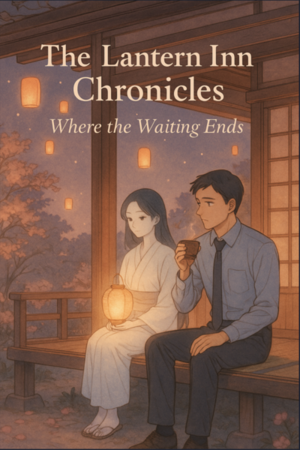Chapter 3:
The Girl With Burned Hands
Lantern Inn Chronicles
Kaito had started sweeping the inn.
No one had asked him to. There were no duties posted on paper walls, no wooden rosters nailed beside the hearth, no bells or orders or rules. The Lantern Inn simply existed, and he — somehow — had become part of its rhythm.
It began with the corner near the old umbrella stand, where dust curled like sleeping spiders. The entryway rug was always slightly crooked, just enough to catch his eye. So he bent down, straightened it, and kept going. A broom leaned beside the back door — light, straw-bristled, worn smooth at the handle from long-forgotten hands.
Maybe it was habit. All those years spent arranging his office desk just so: pens in line, papers squared, keyboard angled. The things no one noticed but he always did. Fixing problems before they were seen. Sweeping away what others left behind.
Or maybe, in the silence of this place, he simply needed to move — to remind himself that he still could.
The days passed gently, without edges. Morning came with pale light through the shoji, filtered gold like old paper. Breakfast was laid out quietly on the table: bowls of rice, pickled radish, hot barley tea that steamed against the frost-touched window.
Sometimes the girl in the blue kimono appeared. Sometimes she didn’t.
She never knocked. She never spoke first. Her presence was more like a season — passing through rooms as if part of the air itself. Her name remained unspoken. When he asked once, she only smiled with a tilt of her head, as though the question was too complicated for an answer.
Kaito had begun keeping a notebook by his bedside — not to write anything profound, just to mark the days.
Day 3. Wiped windows. Found an old map of the town under a floorboard. No guests yet. The willow shed three leaves.
There was a strange peace in it. A hollow sort of contentment — not emptiness, but potential.
Like a stage before a play begins.
Like a life paused at the breath before speaking.
Then came the fifth morning.
Rain arrived not as a drizzle but in full voice — a sudden, heavy downpour that roared against the roof tiles, made the gutters gurgle and the lantern glass fog. Kaito stood under the eaves, tea warming his palms, watching the stone path dissolve into mud.
That’s when he saw her.
A figure at the gate — small, stumbling, soaked to the bone. She moved like a ghost made of rain. Thin arms wrapped around herself, knees buckling with every step. The cloak she wore — far too large — dragged like an anchor behind her. She nearly collapsed before she reached the veranda.
Kaito didn’t hesitate.
He ran to her side, arms outstretched before he even realized he’d moved. She was maybe fourteen, though the weight in her eyes made her seem older. Ash smeared her cheeks. Her bandaged hands trembled, wrapped in cloth stained a sickly, rusted red.
She looked up at him. Her eyes were wide. Not pleading — not even expecting — just stunned, like a creature too long in the dark.
He didn’t speak. Didn’t ask. He simply knelt and opened the door.
That day, she never said a word.
He helped her peel off the sodden cloak and brought her a towel. When she flinched at the sound of running water, he adjusted the temperature of the bath and left quietly, placing a change of robes on a nearby bench.
She shrank from his hand when he reached for her bandages. So he didn’t insist. He only laid clean gauze, fresh balm, and a bowl of miso soup beside her futon. Along with a small plate of warm bread, slightly overbaked, but soft at the center.
She stared at the soup for a long time — longer than most would. Then, slowly, methodically, she lifted the spoon and began to eat.
Not hungrily. Not like someone starved.
But like someone who had never eaten without being watched. Without wondering what price would follow.
Kaito sat just outside the door, lantern by his side, the flame inside still dormant.
He thought to himself:
“She’s afraid of being asked.
Afraid that kindness is a debt she can’t repay.”
That night, sleep came shallow and broken.
He wandered into the main room — the hearth at the far wall cold, though the firewood was stacked, and the kettle gleamed with readiness. He crouched beside it, struck a match, and waited.
The flame flared… flickered… and died.
A voice broke the silence — low, steady, and strangely warm.
“It only lights when someone in the inn feels at peace.”
Kaito turned.
The girl in the blue kimono stood half-veiled in the shadows of the hallway, her form framed by the dim glow of her own lantern. It was the only source of light — small, cradled in her palm like a pocket of sunrise, its amber flicker soft against the quiet dark.
Her feet were bare. Her voice didn’t carry, but it cut cleanly through the stillness.
The hearth before Kaito remained unlit, his match having sputtered out moments before. The kettle sat untouched, the firewood still dry. His shoulders were slightly hunched, and the matchbook trembled faintly in his hand. He had thought the inn was empty — but it never truly was.
“How many people have stayed here?” he asked, after a long pause.
The girl didn’t answer immediately. She tilted her head, a small, birdlike motion, as if listening to something beyond the room — beyond even him.
“Enough,” she said at last. “But not many.”
Her words held weight beyond their brevity, as though she was speaking not of numbers, but of hearts. Of lives that had crossed thresholds and left something behind — or perhaps taken something they hadn’t known they needed.
Kaito looked into the shadows past her. There were no footsteps behind her. Just the lingering scent of hinoki wood, rain-damp tatami, and something like lavender — faint, familiar, nearly forgotten.
He hesitated, then asked, “And that girl?”
There was a long silence.
The girl in the blue kimono didn’t step forward. But the light from her lantern pulsed once, as if in acknowledgment.
“She needs rest,” she said quietly. “And no mirrors.”
The last sentence slid into the air like a whispered warning — gentle, but absolute.
It struck Kaito in the chest, not like a blow, but like an old memory that had resurfaced without invitation.
No mirrors.
He didn’t ask why. He didn’t need to.
Something in him, quiet and instinctive, understood. Mirrors weren’t always for vanity — sometimes they were battlegrounds. Sometimes they showed what the world refused to acknowledge. Sometimes they screamed louder than wounds ever could.
Kaito bowed his head. “I’ll remember,” he said.
She gave a soft nod, then turned without sound. Her lantern flickered once more, then vanished into the hallway like a star dipping below the horizon.
The rain had stopped by morning.
Outside the girl’s room, Kaito left a tray.
On it: a clean cotton robe folded neatly, fresh gauze wrapped with care, a steaming cup of barley tea, and — tucked beside the plate of sweet bean mochi — a small, folded note.
His handwriting was precise, blocky in places, as if he had rewritten the lines more than once.
No one here will ask what hurt you.
But we’ll still be here, if it hurts.
— K.M.
He lingered for a moment after placing the tray, unsure if she was awake. There was no sound from within, just the occasional creak of the building settling into its age.
By afternoon, the tray was empty.
On her third day, the girl appeared in the common room.
She was wrapped in the robe he’d left, its sleeves trailing slightly beyond her wrists. Her hair was damp, clinging to her neck in soft, uneven strands, as though she had only recently stepped out of a bath and hadn’t bothered to dry it fully.
The bandages on her hands had been replaced. Tighter. Cleaner. More purposeful.
She didn’t look at him. Didn’t speak. Just moved slowly to the window, where the willow tree bowed its silvered branches toward the ground as if in greeting.
She sat on the edge of the tatami, knees tucked to her chest, gaze fixed outside. Not watching. Just… being.
Kaito brought her tea — warm, steeped carefully, the barley scent faint but comforting.
She accepted it with both hands, cupping the cup like it might vanish if she held it too lightly.
He sat a few feet away, not facing her, not prying. Just letting the silence breathe.
That was enough.
On the fourth day, her voice emerged — timid, as if borrowed from someone else.
“Do you live here?”
Kaito blinked. Her words were barely louder than the whisper of wind against the shoji doors. But they reached him.
He looked at her — at the fragility in her posture, the weight of what she was trying not to show.
“I suppose I do now,” he said gently. “I was… sent here.”
Her eyes, dark and wide, stayed on the tea in her lap.
“Did you die?”
Kaito hesitated. It was the first time someone had asked so plainly.
He gave a small nod. “Yes.”
She didn’t flinch. Didn’t cry.
Her next question came not with fear, but with curiosity tinged with resignation.
“Are we dead too?”
He looked at her for a long moment, then answered, “I don’t know.”
And somehow, that uncertainty seemed to comfort her more than any truth.
On the seventh day, she appeared in the hallway.
She didn’t knock or call out. Just stood there, one hand resting on the broom that leaned beside the door — the same one Kaito had been using since his first day. Her robe was tied a little tighter now. Her hair was combed.
“Can I help?”
Her voice still carried the hush of someone who’d grown used to punishment following initiative.
Kaito didn’t smile, but he nodded and stepped aside.
He handed her the broom wordlessly. Her fingers curled around the handle — slow, cautious.
As she adjusted her grip, the sleeve of her robe slipped.
Kaito caught a glimpse: raw, pink skin — the kind that came from burns or bindings. Skin that was learning how to heal.
She froze, immediately tugging the sleeve back down, her face tightening with dread — like a child expecting a blow.
But Kaito only turned away and resumed sweeping the hallway.
No questions. No judgment.
Just a quiet, unshaken rhythm.
That evening, while checking the guest rooms, he paused in front of Room 5.
The futon had been straightened. A cup sat empty on the low table. And beneath the pillow, folded carefully but creased from nervous hands, was a scrap of parchment.
Written in uneven, wavering strokes — as though the writer had struggled to hold the pen — were these words:
It hurts less when someone sees it and doesn’t turn away.
No name. No date. Just that single sentence — but it carried the weight of years.
Kaito read it twice. Then a third time.
He folded the note with quiet reverence and slipped it into the back of his notebook, tucking it between pages filled with dates, sketches, and silent questions.
That night, he returned to his room.
It was quiet — as always. The willow tree outside shifted with the wind. A moth tapped gently at the paper wall. He lit a single candle, then turned toward the windowsill.
And paused.
His lantern — the one that had sat cold and dormant since the day he arrived — was glowing.
Not brightly. Not like the girl’s.
But it flickered. Softly. Warmly. A dull amber heartbeat in the dark.
He crouched before it, as though unsure if it were real.
And then, for the first time in years — or maybe lifetimes — he smiled.
Not the practiced kind he’d worn in boardrooms.
Not the tired one he’d used with colleagues at farewell parties.
But something genuine. Quiet. Small.
The kind of smile that belongs to someone who, for the first time in a very long while, feels seen.
Because in a place where people forgot how to belong,
He had held space for someone’s pain — and not turned away.
And in doing so,
He had remembered something of his own worth.




Please sign in to leave a comment.